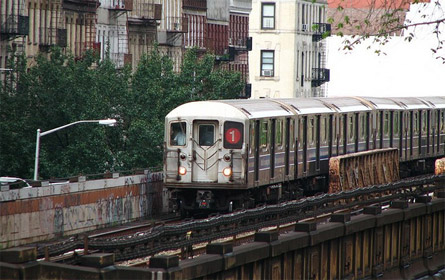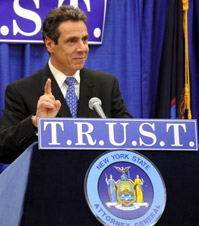
They went down the line -- abolish it, audit it, let the public elect its leaders, put the governor in charge. One-by-one, each gubernatorial candidate castigated the Metropolitan Transit Authority during the New York gubernatorial candidates' debate on Oct. 18.
Almost lost in the shuffle of platitudes and rehearsed one-liners -- "The only difference between the MTA and my former escort agency," quipped former madam Kristin Davis, "is that my agency delivered on-time and reliable service" -- was the fact that, in his comments, Gov.-elect Andrew Cuomo refused to show his plan for the transportation agency.
"It's been unclear what Cuomo's policy priorities are," said Noah Budnick, deputy director of Transportation Alternatives, a New York City transportation advocacy group. "It's hard to know if that means that the door is open and he's willing to entertain ideas. He hasn't ascribed to specific beliefs nor has he said no to anything in particular."
But with the MTA facing ruinous finances, rising fares, reduced service and an unfunded future, the governor will have to take action sooner rather than later. The general consensus in the transit advocacy community is that trimming the fat and implementing more efficient business practices can only do so much to cut expenses.

"Cuomo unequivocally said he wasn't going look to raise revenue for the MTA, that the MTA was going to have to rely on cost cutting and efficiencies," said John Petro, an urban affairs policy analyst at the Drum Major Institute for Public Policy, adding, "I just hope that he has a more comprehensive plan than that."
The Gaping Hole
Despite a series of cost cutting measures and fare hikes, the MTA's budget crunch shows no signs of abating. A recent article reported that a series of moves aimed at bringing in more revenue will fall some $400 million short of what was anticipated. As the agency prepares to adopt an $11.7 billion operating budget , other problems loom, including rising pensions, employee heath care and debt service costs.
Petro, who profiled the decline in a 2009 report titled Solving the MTA Budget Crisis: A Capital Investment Strategy, estimates that the MTA will need to find an extra $1.3 billion annually "just to make sure the transportation system doesn't fall apart," not to mention the extra money needed to even consider expansion and modernization.
The MTA has offered a comprehensive capital program for 2010-2014 that covers all the bases, including needed upkeep as well as expansion projects to keep the MTA on par with other top-notch public transit systems. The price tag: $26.3 billion. Of that, it's estimated that funding will fall roughly $10 billion short over the final three years of the plan.
The plan does not lay out where the funds might come from.
"How the MTA ought to be funded is a question for the legislature," said Aaron Donovan, spokesperson for the MTA. "Our role is simply to make clear the needs that we face and to explain our efforts to overhaul the way the MTA does business."
The legislature, though, has been slow to provide any answers.
"I think the issues involving mass transit are immediate," said State Sen. Jose M. Serrano, whose district spans parts of the Bronx and Upper Manhattan. "I'm not saying I know what the answer is, though. I don't know if increasing streams of revenue is the answer."
The seven gubernatorial candidates offered various answers -- a restructuring of MTA management, increased tolls, raised taxes and fees on real estate developers, selling contracts to private companies, tax-free transit benefits for employers and lower cost transit options. Cuomo has not shown a preference for any of these plans.
Making Drivers Pay
Cuomo has, though, been adamant about not increasing any taxes.
"I have a feeling that for the first couple of years, the main agenda for the governor will be how do we turn this government around? How do we close the deficit?" Serrano said. "And I believe him when he says he's going to do it without increasing taxes."
That has transit advocates and others looking at alternative ways to raise money. One new form of revenue for the MTA is congestion pricing, which essentially charges people to drive into parts of Manhattan during business hours. When Mayor Michael Bloomberg proposed it in 2008, the State Assembly failed to vote on it.
"It will be back," Budnick said. "No matter what financial crisis you want to look at -- the city the state or the MTA -- there’s a desperate need for new revenue sources."
Serrano thinks the legislature's perception of the bill as a rise in taxes might determine the fee's ultimate success or failure. Viewed as a new tax, congestion pricing would run counter to Cuomo's no new taxes stance. Serrano supports congestion pricing as well as levying tolls on certain bridges into Manhattan.
"I don’t know if it's viewed mainly as a revenue stream or mainly as a tax," Serrano said, adding that he would prefer "people view it more as a way to alleviate congestion in the city."
There are a few reasons to expect congestion pricing to factor into the MTA's future. Drivers commuting into the city benefit from having 5 million transit riders off the streets but do not contribute to public transit funding. Budnick calls them "the biggest free riders."
Jay Walder, the MTA's chairman and chief executive officer, oversaw the successful implementation of congestion pricing at his former post as finance director of Transport for London, which manages that city's subways, buses and commuter rails. Started in 2003, London’s congestion pricing reduced traffic by 20 percent in the city and raised 122 million pounds (roughly $183 million) in its second year. Walder avoided taking a stance on congestion pricing when he came to the MTA.
Petro estimates that, optimistically, congestion pricing could raise around $400 million a year. He warns against seeing it as a cure-all solution -- "It's vital … but we need to explore other options."
As an alternative, in 2008, Richard Ravitch, now the outgoing lieutenant governor, recommended the state put tolls on the free East River and Harlem River bridges to raise money for transit. That also failed to make it through the legislature.
At the time Ravitch released a report on the state of New York State's transportation infrastructure, which bluntly began, "New York State currently lacks the revenues necessary to maintain its transportation system in a state of good repair, and the state has no credible strategy for meeting future needs.".
In the past two years, little seems to have changed.
Who's in Charge
In not acting on any of the revenue producing measures, legislators have repeatedly charged the MTA with mismanagement. During the debate, Cuomo did appear to stake out a position on that. "I believe the governor should be accountable for the MTA," he said. "People have the right to know who's in charge and who's responsible, and I think it should be the governor."
What exactly that means in terms of a potential overhaul of the MTA's management structure remains unclear, though. While the MTA is considered a quasi-independent authority, the governor himself directly nominates six of the 17 members of the board of directors, including the chairman and CEO. The mayor recommends four to the governor.
"I think he can exercise leadership, but I don't think a restructuring of the board is useful in the long term," said Gene Russianoff, staff attorney for the Straphangers Campaign of the New York Public Interest Research Group.
The current chair, Walder, has been commended by transit experts for saving $525 million through consolidation of redundant positions, elimination of excessive overtime pay, pay freezes for management and other initiatives.
Historically, a new governor selects his own head of the MTA. Russianoff was one of 11 signatories on a letter sent to Cuomo urging him to retain Walder.
"I don't think much would be gained by replacing Walder with someone who would require a learning curve," Russianoff said. "We've had our disagreements with Walder, but he's been a candid professional and can remain on merit."
Plus, Walder's six-year contract, signed in July 2009, was cleverly constructed so it would be costly for any incoming governor to replace him.
Transit Transition
Cuomo's transition team on transportation could provide some clue of what the governor-elect might be thinking about any of this. Transit advocates are noticeably absent. The panel is heavy on representatives from the private sector.
"First and foremost I think they're about dollars and cents and jobs," Budnick said. "I think that gives an insight into where Cuomo's looking. If you look at the list of who's on the transition team, it's unclear what it implies in terms of his policy priorities."
Pundits point to the disparity between Cuomo's transportation transition team and that of former Gov. Elliot Spitzer, which featured more transportation advocates and labor union representatives. With the contract between the Transport Workers Union Local 100 and the government up in a year, Petro thinks Cuomo may be sending a message with his money-before-policy mentality.
"I think Cuomo thinks that talking about raising revenue before the contract renegotiations is a poor idea," Petro said. "Is that in the best interest for the city and transit riders and for the region's economy? No. The longer we wait, the bigger the hole is going to be. But Cuomo has drawn a line in the sand, so to speak, that he will not look to raising revenue for the MTA without [first] making the point to labor that he expects more efficiencies."
Russianoff, who served on Spitzer’s transportation transition team, believes Cuomo will continue to emphasize cost cutting and management "until the beginning of 2012 when they start running out of money. It's going to look a little different then."
During that span the $525 million Walder has already finagled in savings is expected to rise -- reaching $700 million by 2014, according to Donovan. Those additional savings would come from the deferment of roughly half of the 280 current construction and restoration projects and a thorough consolidation of maintenance operations, inventory management and operations support activities. The MTA already stalled expansion plans and eliminated two subway lines and 36 bus routes last year.
Other Options
In the search for a solution, Cuomo could look some less-discussed revenue options that other cities have tried with mixed results.
San Francisco requires developers to reimburse the government for at least a portion of the cost associated with providing additional public services to people who live in or otherwise take advantage of a new project. In New York, while real estate developers do contribute to transit funding, Petro believes they could afford to pitch in more.
Chicago and London both awarded special contracts to private businesses in return for transit improvements. In Chicago, the government gave Apple Inc. exclusive advertising rights in a station in exchange for the cost of refurbishing the stop. More recently, Chicago announced it is considering selling the naming rights to the various public train lines.
During Walder’s time in London, however, he witnessed the downside of privatization. The city signed a 30-year public private partnership with three infrastructure companies, charging them with maintenance and upkeep of London's underground train system, the Tube. This past May, however, the city bought out the remaining public private partnerships after one of the companies went bankrupt, losing several hundred million pounds of taxpayer money.





